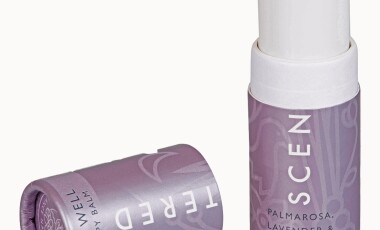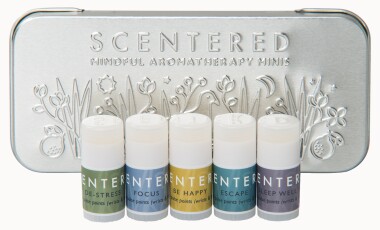If you’ve ever used blackout shades or listened to mellow bedtime music, you already know that sight and sound can be your tickets to dreamland. But have you tried using your sense of smell to get better sleep? That’s where aromatherapy comes in.
Aromatherapy is a therapeutic technique that involves breathing in or topically applying highly concentrated oils. These oils, also known as essential oils, are extracted from the flowers, roots, leaves, or seeds of plants. It takes pounds and pounds of flowers to make one bottle of essential oil.
“Scents used in aromatherapy prompt our nervous system to transmit signals to the limbic system in the brain,” says Holly Schiff, Ph.D., a licensed clinical psychologist who specializes in sleep. “This is the same part of the brain that houses emotion and memory. So, you can condition your brain to sleep with a certain kind of scent.”
Aside from its cozy vibes, aromatherapy can be an invaluable tool for quieting distracting thoughts and getting some shut-eye — and there are plenty of ways to try it for yourself at home.
Methods of aromatherapy to try
There are several ways to experiment with aromatherapy, and explore the sleep benefits the fragrances could offer. Read on for expert-approved aromatherapy methods that can improve your sleep quality.
Diffusers and misters
If you love the idea of being surrounded by a strong smell that takes your brain far away, an essential oil diffuser might be just what you’re looking for. Diffusers are ideal for helping you sleep because they’re long-lasting, creating mist continually throughout the night.
There are different types diffusers which use different methods of releasing fragrance into the air. The type you like may depend on how strong you want the scent to be (whole room vs. your desk space) or how easy it is to clean the diffuser machine.

Most common diffusers have ultrasonic technology, which uses vibrations rather than heat to break down essential oils and water that are then misted into the room. Other diffuser technologies include:
- passive: releases fragrance through ceramic, natural wood, or reeds
- heat: uses fire or electricity to warm up the oil until it evaporates into the air
- evaporative: uses a fan to disperse the scent throughout the room
- nebulizer: heatless and water-free, this method uses air pressure to turn essential oils into vapors
Topical application, such as massage oil or body lotion
For better sleep, Schiff recommends massaging a sleep-boosting essential oil onto your forehead, wrists, and neck. This method allows you to benefit from both inhalation of the oils and full muscle relaxation. “They also enter your bloodstream quicker and get absorbed through the skin,” she explains.
While research shows that essential oils are safely metabolized in the body, you should always dilute your oils with a vegetable-based oil such as olive or coconut to help prevent skin irritations and allergic reactions. The Alliance of International Aromatherapists recommends essential oils be diluted to 2-3% concentration for massages and body lotion.
Facial steaming and compresses
Using facial steaming 15 to 20 minutes before bed can be an effective way to relax before your sleep session. A small 2019 study found that adult men who tried steam inhalation were more relaxed and had more deep sleep.
You don’t even need an official steamer. This DIY hack is easy: Just add one to three drops of essential oil to a large pot of warm water and lean over the pot with a towel covering your head for about 10 to 15 minutes.
You can also make a hot towel compress with the water and wrap the towel around a sore area to encourage muscle relaxation.
Aromatic baths
Taking an aromatic bath 1 to 2 hours before bedtime is another great way to get started with aromatherapy. Schiff recommends adding drops of a soothing essential oil like lavender to your bathwater and stirring it before soaking. As an added bonus, the heated water will relax your muscles, which promotes better sleep.
Essential-oil infused products
Not a fan of mist and humidity? There are plenty of products that now come infused with calming essential oils. Blanquil makes memory foam aromatherapy pillows in lavender and chamomile that are perfect for side sleepers.
[Note: If you buy something using a link on our site, we may earn a commission.]
How does aromatherapy work?
A 2021 review looking at the effect of essential oils and mood regulation notes that the amygdala, which is part of your limbic system, is responsible for processing your emotional response and controlling the scent intensity.
“When you smell or breathe in essential oils, they're picked up by receptors in the nose and sinuses,” says aromatherapist Holly Spears. From there, they travel to the olfactory bulb, the olfactory cortex, and finally to your limbic system, the part of your brain which controls your mood and emotions.
Benefits of aromatherapy
Aromatherapy has many health benefits, including:
- aiding with sleep
- elevating mood and relieving stress
- alleviating sore muscles
- helping to treat acne
Which essential oils help with improving sleep quality?
Our sense of smell plays a significant role in memory recall, emotion, and sleep. “Many essential oils have properties that promote relaxation, helping you fall asleep more quickly and stay asleep all night,” explains Spears.
Although research on essential oils is limited, lavender is the most widely used for sleep support. Not only can it improve our overall quality of rest, but it can also help fight off the anxiety we often store up before bedtime. Some studies suggest lavender as a natural remedy for treating insomnia.
According to Spears, other popular essential oils used for sleep include Roman chamomile, ylang ylang, bergamot, frankincense, and valerian.
How to know you’re getting quality essential oils
Aromatherapy can help soothe your body and mind, which can lead to reduced fatigue and deeper sleep. That being said, not all essential oils are created equal. Experts agree that since they aren’t regulated by the FDA, consumers should take care to buy high quality products.

If you’re ready to give aromatherapy a try but aren’t sure how to differentiate between pure essential oils and cheap imitations, don’t sweat it. Below are some tips to help you determine the quality of oils before buying them.
- Check the bottle: Quality suppliers use dark glass bottles with an eyedropper cap.
- Read the label: It should state which plant parts were used to make the oil and how it was extracted and its growing conditions.
- Verify the source: If there’s no Latin name listed and the seller uses the word “fragrance,” it’s likely that the oil is fake.
- Opt for organic essential oils: This ensures that certain pesticides haven’t been used during the growing process.
- Use oils from a reputable company: Search for real, reputable reviews online to gauge the quality of both the product and the company.
Are there downsides or risks to using aromatherapy?
Essential oils cause reactions in the body and can have adverse effects when combined with certain medications, Schiff says. They can also produce mild side effects including nausea, headaches, sun sensitivity, and some allergic reactions.
“The concentration of the product can actually be poisonous if not diluted correctly,” Schiff explains. “Some oils also produce toxins.”
While essential oils can provide many benefits, experts maintain that it’s important to follow instructions carefully before adding them to your sleep routine. Schiff advises speaking with a trained aromatherapist, nurse, doctor, or pharmacist before using an oil for healing purposes.
While strong essential oils may not be for everyone, you may still be able to enjoy lighter forms of aromatherapy through a hot cup of tea or candles. Strong and familiar scents like lavender and bergamot could be just the scent you need to induce relaxation before bedtime.
And if diffusers and steam baths perfuming the room aren’t quite your style, there is always the DIY linen spray. Customize your own cozy scent, spritz it on your bedding, and lay your head right into a light cloud of comfort. Now that’s the way to dreamland.













